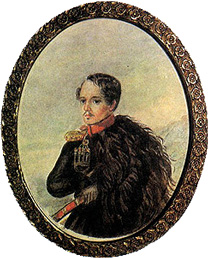 The
greatest among the descendants of George Learmont (1613 ensign, went
over to Russians with other Scots in Polish garrison of Belaya, served
under Prince Pozharsky and granted land near Galich (ca. 1593-1634, near
Smolensk)). He had interest in Burns and Scott and expressed his
yearning for Scotland in poems like “Tomb of Ossian” and
“Desire”. His relatives and acquaintances included Cobleys,
Hamilton-Khomutovs, Mounseys and Barclays de Tolly. Strangely, he fell
in a duel near a place called Little Scotland, founded by Scots
missionaries in the Caucasus. Lermontov’s earliest translation into
English duly appeared in “Blackwood’s Edinburgh Magazine”, 1843,
LIV. {Lermontovskaya Entsiklopediya} The
greatest among the descendants of George Learmont (1613 ensign, went
over to Russians with other Scots in Polish garrison of Belaya, served
under Prince Pozharsky and granted land near Galich (ca. 1593-1634, near
Smolensk)). He had interest in Burns and Scott and expressed his
yearning for Scotland in poems like “Tomb of Ossian” and
“Desire”. His relatives and acquaintances included Cobleys,
Hamilton-Khomutovs, Mounseys and Barclays de Tolly. Strangely, he fell
in a duel near a place called Little Scotland, founded by Scots
missionaries in the Caucasus. Lermontov’s earliest translation into
English duly appeared in “Blackwood’s Edinburgh Magazine”, 1843,
LIV. {Lermontovskaya Entsiklopediya}
Born
on October 3 (New Time Oct. 15), 1814 - died July 15 (New Time July 27),
1841
The freedom loving Russian Romantic poet, whose forebears sprang from
the county of Fife, and author of the novel GEROY NASHEGO VREMENI (1840,
Hero of Our Time), which had a deep influence on later Russian writers.
Lermontov was exiled two times to the Caucasus because of his
libertarian verses. He died in a duel like his great contemporary poet
Aleksandr Pushkin.
THE SAIL
A lone white sail shows for an instant
Where gleams the sea, an azure streak.
What left it in its homeland distant?
In alien parts what does it seek?
The billows play, the mast bends, creaking,
The wind, impatient, mons and sighs...
It is not joy that it is seeking,
Nor is't from happiness it flies.
The blue waves dance, they dance and tremble,
The sun's bright rays caress the seas.
And yet for storm it begs, the rebel,
As if in storm lurked calm and peace!...
(1832)
Translated by Irina Zheleznova, from Mikhail Lermontov: Selected
Works, Progress Publishers, Moskow, 1976
Mikhail Lermontov was born in Moskow. His
mother died when he was three and his father left the upbringing in the
hands of his wealthy grandmother. He received extensive education at
home, and moved then to Moskow. Lermontov entered the Moskow University
in 1830 and started to write poetry under the influence of Lord Byron.
He studied ethics and politics, later literature, but was expelled two
years later for disciplinary reasons. He then went to St. Petersburg and
graduated from the cadet school in 1834. He was stationed in the same
town and observed and criticized the social life of the wealthy.
In 1837 Lermontov gained a wider
recognition as a writer. He published an elegy, SMERT POETA, on the
death of Alexandr Pushkin, in which he saw the court aristocracy as
executioners of freedom. Lermontov was arrested and exiled for some time
to the Caucasus.
In the same year appeared the poem
About Czar Ivan Vasiliyevich, His Young Bodyguard, and the Valiant
Merchant Kalashnokov. The scenery of Caucaus inspired Lermontov's
best poetry. He produced a series of tales, later collected under the
title A Hero of Our Times, in which he painted his revealing and
Byronic self-portrait. During this creative period he wrote such
masterpieces of Russian poetry as The Novice, The Cliff, Argument,
Meeting, A Leaf, and Prophet. In Cloud (1840)
the poet contrasted himself to the coulds that have no native land and
do not know exile. Lermontov's best-known poem, The Demon (1842),
was about an angel who falls in love with a mortal, Tamara. He drafted
it first at the age of 14. The earth is regarded in the work as a
prison, where the Demon wanders. His fiery embrance kills Tamara, whose
suffering has made her worthy of salvation. But the Demon's only chance
of salvation has proved illusory.
Because of a duel with French
ambassador's son, Lermontov was again exiled, this time to Tenginskii
Infantry Regiment on the Black Sea. Pretending to be ill, Lermontov
returned to the health resort of Pyatigorsk, near Moskow and joined the
social life of the town. He quarreled with Major N.S. Martynov, an old
acquiantance of the family, and was killed at the age of 27 in a duel. |

